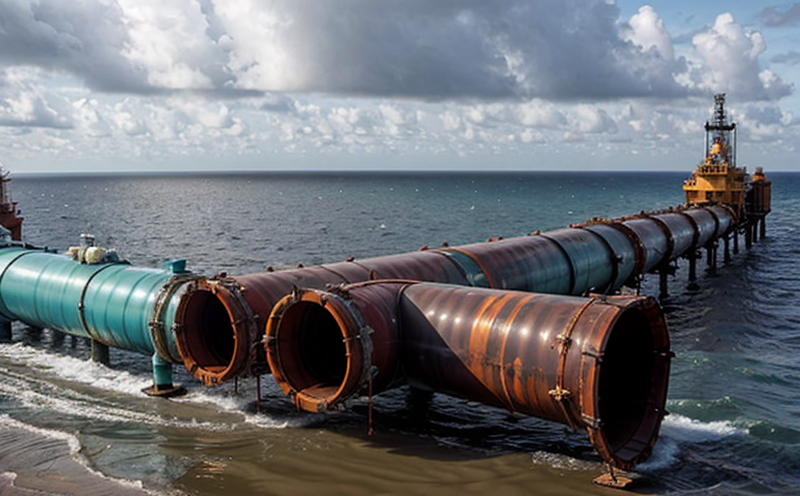Corrosion Effects on Offshore Pipeline Materials
The Silent Enemy of Offshore Pipelines Understanding Corrosion Effects on Materials
As the worlds energy demands continue to rise, offshore pipelines have become a vital component in ensuring the safe and efficient transportation of crude oil and natural gas from production platforms to refineries and processing facilities. However, these underwater pipes are susceptible to corrosion, a silent enemy that can compromise their integrity and put entire operations at risk.
Corrosion Effects on Offshore Pipeline Materials is a critical laboratory service provided by Eurolab, designed to help businesses mitigate the risks associated with pipeline degradation. In this article, we will delve into the world of offshore pipeline corrosion, exploring its causes, effects, and the importance of regular testing. Well also discuss the benefits of using Corrosion Effects on Offshore Pipeline Materials and answer frequently asked questions about this essential service.
What is Corrosion Effects on Offshore Pipeline Materials?
Corrosion Effects on Offshore Pipeline Materials is a comprehensive laboratory analysis that assesses the corrosive properties of pipeline materials in offshore environments. This testing involves simulating the conditions found in underwater pipelines, including exposure to seawater, pressure, and temperature fluctuations.
The service evaluates the materials resistance to corrosion, identifying any weaknesses or vulnerabilities that could lead to pipeline failure. By understanding the corrosive effects on offshore pipeline materials, businesses can take proactive measures to prevent costly repairs, minimize downtime, and ensure the continued safe operation of their pipelines.
Why is Corrosion Effects on Offshore Pipeline Materials Essential for Businesses?
Corrosion Effects on Offshore Pipeline Materials provides numerous benefits that can significantly impact a businesss bottom line. Here are just some of the advantages
Improved Safety Regular testing helps identify potential corrosion hotspots, reducing the risk of pipeline rupture and ensuring a safer working environment.
Increased Efficiency By understanding material performance under offshore conditions, businesses can optimize maintenance schedules and reduce downtime associated with unplanned repairs.
Reduced Costs Early detection of corrosion issues saves companies from costly repairs, replacement of materials, or even complete pipeline replacement.
Enhanced Compliance Demonstrated adherence to regulatory requirements and industry standards enhances a businesss reputation and credibility in the market.
Long-Term Reliability Corrosion Effects on Offshore Pipeline Materials provides valuable insights into material performance over extended periods, enabling informed decisions about pipeline life expectancy.
Key Benefits of Corrosion Effects on Offshore Pipeline Materials
Here are some of the key benefits of using Corrosion Effects on Offshore Pipeline Materials
Comprehensive Analysis Eurolabs laboratory service conducts a thorough examination of pipeline materials, including
Chemical analysis to identify corrosive elements
Microbiological testing for biofilm formation and growth
Physical testing to assess material strength and durability
Customized Solutions Our team works closely with clients to develop tailored testing programs that meet specific business needs.
Industry Expertise Eurolabs experienced professionals possess in-depth knowledge of offshore pipeline corrosion, ensuring accurate and reliable results.
Regulatory Compliance Our laboratory service is designed to meet or exceed industry standards and regulatory requirements.
QA Frequently Asked Questions about Corrosion Effects on Offshore Pipeline Materials
Here are some common questions and answers related to Corrosion Effects on Offshore Pipeline Materials
Q What types of materials can be tested for corrosion effects?
A Eurolabs laboratory service evaluates a wide range of pipeline materials, including steel, stainless steel, aluminum, and other alloys.
Q How long does the testing process take?
A Testing times vary depending on the complexity of the analysis. Typically, results are available within 2-4 weeks.
Q Can I request customized testing programs for my specific needs?
A Yes! Our team works closely with clients to develop tailored testing programs that meet business requirements and regulatory needs.
Q Is Corrosion Effects on Offshore Pipeline Materials a mandatory requirement for offshore pipelines?
A While not mandatory, regular corrosion testing is highly recommended as part of ongoing maintenance and operations. It helps ensure the continued safe operation of pipelines and compliance with industry standards.
Conclusion
Corrosion Effects on Offshore Pipeline Materials is an essential laboratory service that provides businesses with critical insights into pipeline material performance in offshore environments. By understanding the corrosive effects on materials, companies can take proactive measures to prevent costly repairs, minimize downtime, and ensure a safer working environment.
At Eurolab, our team of experts is dedicated to providing comprehensive testing solutions that meet industry standards and regulatory requirements. If youre concerned about pipeline corrosion or would like to learn more about Corrosion Effects on Offshore Pipeline Materials, contact us today to discuss your specific needs and requirements.
Remember, a safe and efficient offshore pipeline operation begins with understanding the corrosive effects on materials. Trust Eurolabs expertise to help you navigate the complex world of offshore pipeline corrosion management.




